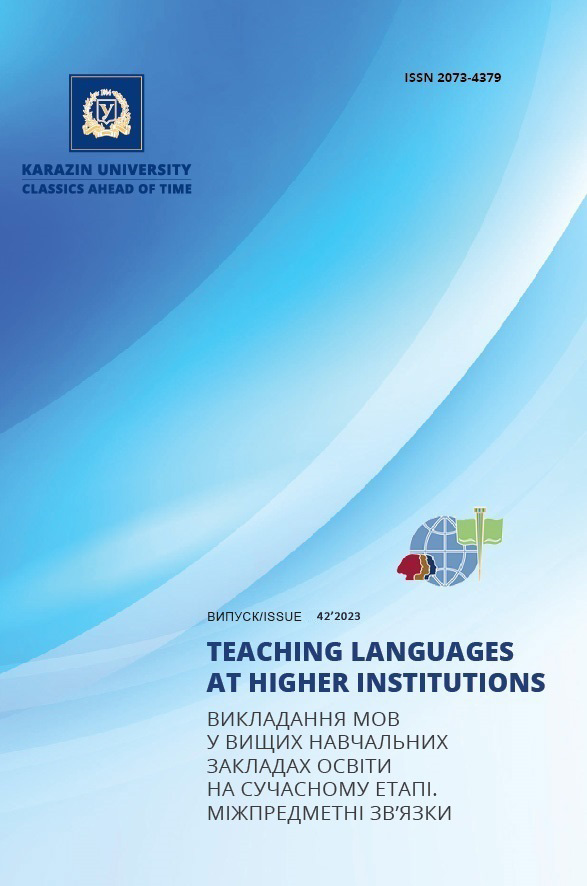Основи наукової комунікації іноземною мовою для магістрів історії: методичний аспект
Анотація
У статті висвітлено проблематику досліджень з англійської мови для академічних цілей, виокремлено професійні та академічні компетентності магістрів з історії, наголошено на значенні дисципліни у подальшому професійному зростанні. Незважаючи на те, що в літературі представлено низку теоретичних і педагогічних моделей розробки курсів з англійської для академічних цілей, відсутні конкретні методики створення робочих програм для магістрів історії. Авторська методика викладання дисципліни «Основи наукової комунікації іноземною мовою» впроваджується та методично обґрунтовуються в робочій програмі, а також практично реалізуються на базі електронного навчально-методичного комплексу для підготовки магістрів першого та другого курсу спеціальності 032 Історія та археологія. Компетентністно-орієнтований підхід втілено у вихідній концепції англійської для академічних цілей щодо зосередженості на професійно-орієнтованих текстах та науковій комунікації у сфері академічної історії, де мова є первинним складником змістотворення, що охоплює хронологічне мислення, здатність ідентифікувати історичні події у часовій послідовності; історичне розуміння, навички читання та побудови історичних наративів; історичний аналіз та інтерпретацію, порівняльний аналіз та диференціацію досвіду, переконань, ідеологій; історичні дослідження, що ґрунтуються на аналізі історичних подій і стратегій прийняття рішень, здатності досліджувати дискусійні історичні проблеми на основі історичних джерел, знаходити протиріччя в історичних документах і встановлювати суспільно значущі історичні інтерпретації. Зосередження уваги на соціокультурних і професійних компетентностях в етичному вимірі дає можливість встановити взаємозвʼязки між історичними подіями в їх часовій послідовності минуле-теперішнє-майбутнє в історичній перспективі. Авторська робоча програма з дисципліни та впроваджений електронний навчально-методичний комплекс практично спрямовані на розвиток у студентів загальної та професійно орієнтованої комунікативної компетентності англійською мовою (лінгвістичної, соціолінгвістичної та прагматичної) для успішного ефективного спілкування в навчальній діяльності та професійному середовищі.
Завантаження
Посилання
Anderson, R. (2014). A Parallel Approach to ESAP Teaching. Procedia – Social and Behavioral Sciences. 136, pp. 194–202. DOI: https://doi.org/10.1016/j.sbspro.2014.05.313.
Bain, R. (2000). Models for teaching. Stearns, P., Seixas, P., Wineburg, S. (Eds.). Knowing, teaching and learning history. New York University Press, pp. 331–352.
Basturkmen, H. (2021). Linguistic Description in English for Academic Purposes. New York: Routledge.
Bernad-Mechó, E. (2021). Combining Multimodal Techniques to Approach the Study of Academic Lectures: A Methodological Reflection. Journal of the Spanish Association of Anglo-American Studies. 43.1, pp. 178–198. DOI: http://doi.org/10.28914/Atlantis-2021-43.1.10.
EDUCATIONAL AND SCIENTIFIC PROGRAM 032.00.01. History second (masterʼs) level of higher education. (2019). Аpproved by the decision of the Academic Council of Borys Grinchenko Kyiv University. May 30, 2019. Available at: ttps://kubg.edu.ua/images/stories/Departaments/ vstupnikam/iff/ 2019/ op_master-ist_eng.pdf [Accessed 20 Jan. 2023].
Fedorova, N. (2021). Questioning EAP: a critique of the English for Academic Purposes courses at university. The journal of teaching English for Specific and Academic Purposes. 9, pp. 401−408. DOI: https://doi.org/10.22190/JTESAP2103401F.
Martin, B., Huijgen, T., Henkes, B. (2021). Listening like a historian? A framework of ʼoral historical thinkingʼ for engaging with audiovisual sources in secondary school education. Historical Encounters: A journal of historical consciousness, historical cultures, and history education. 8(1), pp. 120−138. DOI: https://doi.org/10.52289/hej8.108.
Mavadat, S., Talebi, S. (2021). Genre Analysis of Research Article Abstracts in English for Academic Purposes Journals: Exploring the Possible Variations across the Venues of Research. Education Research International. 2021. (Article ID 3578179), 5, p. 408. DOI: https://doi.org/10.1155/2021/3578179.
Pearson, W.S. (2020). Mapping English Language Proficiency Cut-Off Scores and Pre-Sessional EAP Programmes in UK Higher Education. Journal of English for Academic Purposes. 45, pp. 1−11. DOI: https://doi.org/10.1016/j.jeap.2020.100866.
Ramdhani, A.M., Naim, M., Sumardi. (2018). Developing studentʼs historical consciousness by understanding the Indonesian history and the historical thinking. IOP Conference Series: Earth and Environmental Science, 243, The First International Conference on Environmental Geography and Geography Education (ICEGE) 17–18 November 2018, University of Jember, East Java, Indonesia. DOI: https://doi.org/10.1088/1755-1315/243/1/012150.
Song, Y., Zhou, J. (2022). Revising English Language Course Curriculum Among Graduate Students: An EAP Needs Analysis Study. SAGE Open. 12 (3), pp. 1−15. DOI: https://doi.org/10.1177/21582440221093040.
Van Driel, J., van Drie, J., van Boxtel, C. (2022). Struggling with historical significance: Reasoning, reading, and writing processes. European Journal of Applied Linguistics. 10 (1), pp. 185−211. DOI: https://doi.org/10.1515/eujal-2021-0004.
Walková, M., Bradford, J. (2022). Constructing an Argument in Academic Writing Across Disciplines. ESP Today. 10 (1), pp. 22−42. DOI: https://doi.org/10.18485/esptoday.2022.10.1.2.
Zabolotna, O., Gut, N., Shcherban, I. (2022). The role of English for Academic Purposes in maintaining future teachersʼ interest in research. Advanced Education. 9 (20), pp. 115–120. DOI: https://doi.org/10.20535/2410-8286.256236.

